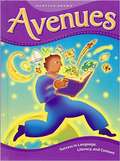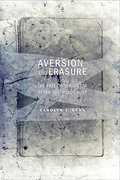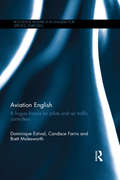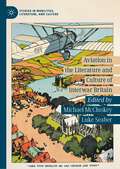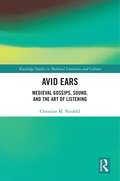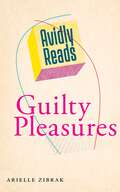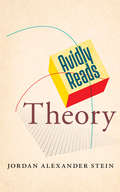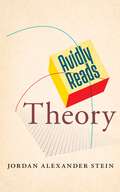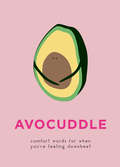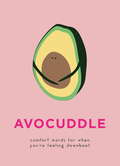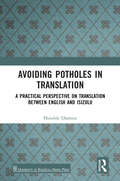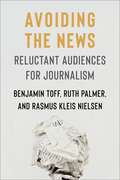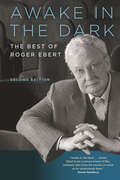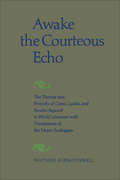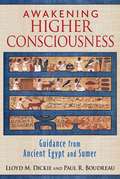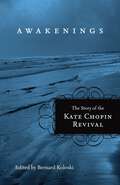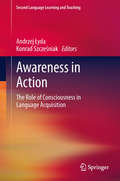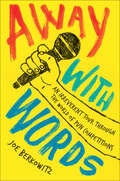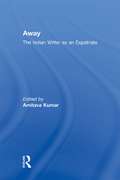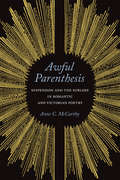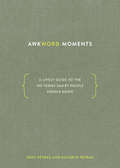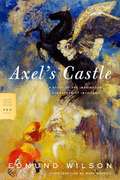- Table View
- List View
Avenues: Success in Language, Literacy, and Content (Level F)
by Deborah J. Short Josefina Villamil Tinajero Alfredo Schifini Erminda Garcia Eugene E. Garcia Else Hamayan Lada Kratky"An anthology of fiction and non-fiction with vocabulary, comprehension exercises.
Aversion and Erasure: The Fate of the Victim after the Holocaust
by Carolyn DeanIn Aversion and Erasure, Carolyn J. Dean offers a bold account of how the Holocaust's status as humanity's most terrible example of evil has shaped contemporary discourses about victims in the West. Popular and scholarly attention to the Holocaust has led some observers to conclude that a "surfeit of Jewish memory" is obscuring the suffering of other peoples. Dean explores the pervasive idea that suffering and trauma in the United States and Western Europe have become central to identity, with victims competing for recognition by displaying their collective wounds.She argues that this notion has never been examined systematically even though it now possesses the force of self-evidence. It developed in nascent form after World War II, when the near-annihilation of European Jewry began to transform patriotic mourning into a slogan of "Never Again": as the Holocaust demonstrated, all people might become victims because of their ethnicity, race, gender, or sexuality—because of who they are.The recent concept that suffering is central to identity and that Jewish suffering under Nazism is iconic of modern evil has dominated public discourse since the 1980s.Dean argues that we believe that the rational contestation of grievances in democratic societies is being replaced by the proclamation of injury and the desire to be a victim. Such dramatic and yet culturally powerful assertions, however, cast suspicion on victims and define their credibility in new ways that require analysis. Dean's latest book summons anyone concerned with human rights to recognize the impact of cultural ideals of "deserving" and "undeserving" victims on those who have suffered.
Aviation English: A lingua franca for pilots and air traffic controllers (Routledge Research in English for Specific Purposes)
by Dominique Estival Candace Farris Brett MolesworthAviation English investigates the key issues related to the use of English for the purpose of communication in aviation and analyses the current research on language training, testing and assessment in the area of Aviation English. Based on a series of recent empirical studies in aviation communication and taking an interdisciplinary approach, this book: provides a description of Aviation English from a linguistic perspective lays the foundation for increased focus in the area of Aviation English and its assessment in the form of English Language Proficiency (ELP) tests critically assesses recent empirical research in the domain. This book makes an important contribution to the development of the field of Aviation English and will be of interest to researchers in the areas of applied linguistics, TESOL and English for Specific Purposes.
Aviation in the Literature and Culture of Interwar Britain (Studies in Mobilities, Literature, and Culture)
by Luke Seaber Michael McCluskeyAviation in the Literature and Culture of Interwar Britain looks at the impact of aviation in Britain and beyond through the 1920s and 1930s. This book considers how in this period flying went from a weapon of war to an extensive industry that included civilian air travel, air mail delivery, flying shows and campaigns to create ‘airmindedness’. Essays look at these developments through the work of writers, filmmakers and flyers and examines the airminded modernism that marked this radical period. Its fourteen chapters include studies of texts by Virginia Woolf, George Orwell, Elizabeth Bowen, W.H. Auden, T.H. White and John Masefield; accounts of the annual RAF Display at Hendon and the Schneider Trophy; and the achievements of celebrity flyers such as Amy Johnson. This collection provides a fresh perspective on the interwar period by bringing analysis of aviation and airmindedness to the study of British literature, history, modernism, mobilities and the history of technology and transportation.
Avid Ears: Medieval Gossips, Sound and the Art of Listening
by Christine M NeufeldArguing that women’s "silencing" is in part the result of women’s voices being treated as the white noise of history, Avid Ears: Medieval Gossips, Sound, and the Art of Listening explores the historical representation of female voices as actual acoustic phenomena. The volume focuses on English antifeminist satire during the linguistically dynamic late Middle Ages to argue that the resonant gossips’ circle offers a cultural poetics of listening for those attentive to medieval auditory regimes. Understanding what it means to listen from both medieval and modern perspectives can challenge, so this book argues, the specular logic informing a long satirical tradition that casts the noisy speaking woman as the nemesis who confirms the social authority of the erudite man. Discerning the acoustic preoccupations of the gossips’ circle inevitably hovering behind the shrew, Avid Ears explains why the threat posed by a woman talking back to a man is only exceeded by that of a woman speaking to other women. The first book-length study to use sound studies to explore how gender registers in the medieval literary soundscape, Avid Ears attunes critics to how and what we hear when women speak in literature.
Avidly Reads Guilty Pleasures
by Arielle Zibrak"My guilty pleasure wasn’t just reading low-brow fiction or even female-authored fiction, it was being femme itself."What is it about ribald romance novels, luxurious interior design, and frothy wedding dresses that often make women feel their desires come with a shadow of shame? In Avidly Reads Guilty Pleasures, Arielle Zibrak considers the specifically pleasurable forms of feminine guilt and desire stimulated by supposedly “lowbrow” aesthetic tendencies. She takes up the overwhelming preoccupation with the experience of being humiliated, dominated, or even abused that has pervaded the stories that make up women’s culture—from eighteenth-century epistolary novels to popular twentieth-century teen magazine features to present-day romantic comedies.In three chapters—“Rough Sex,” “Expensive Sheets,” and “Saying Yes to the Dress”—that mirror the plot structures of feminine fictions themselves, this book tells the story of the desires that only the guiltiest of pleasures evoke. Zibrak reexamines documents of femme culture long dismissed as “trash” to reveal the surprisingly cathartic experiences produced by tales of domination, privilege, and the material trappings of the heteropatriarchy.Part of the Avidly Reads series, this slim book gives us a new way of looking at American culture. With the singular blend of personal reflection and cultural criticism featured in the series, Avidly Reads Guilty Pleasures reclaims women’s experiences for themselves.
Avidly Reads Poetry
by Jacquelyn Ardam“Poetry has leapt out of its world and into the world”Poetry is everywhere. From Amanda Gorman performing “The Hill We Climb” before the nation at Joe Biden’s Presidential inauguration, to poems regularly going viral on Instagram and Twitter, more Americans are reading and interacting with poetry than ever before. Avidly Reads Poetry is an ode to poetry and the worlds that come into play around the different ways it is written and shared.Mixing literary and cultural criticism with the author’s personal and often intimate relationship with poetry, Avidly Reads Poetry breathes life into poems of every genre—from alphabet poems and Shakespeare’s sonnets to Claudia Rankine’s Citizen and Rupi Kaur’s Instapoetry—and asks: How do poems come to us? How do they make us feel and think and act when they do? Who and what is poetry for? Who does poetry include and exclude, and what can we learn from it?Each section links a reason why we might read poetry with a type of poem to help us think about how poems are embedded in our lives, in our loves, our educations, our politics, and our social media, sometimes in spite of, and sometimes very much because of, the nation we live in.Part of the Avidly Reads series, this slim book gives us a new way of looking at American culture. With the singular blend of personal reflection and cultural criticism featured in the series, Avidly Reads Poetry shatters the wall between poetry and “the rest of us.”
Avidly Reads Theory
by Jordan Alexander SteinAvidly Reads is a series of short books about how culture makes us feel. Founded in 2012 by Sarah Blackwood and Sarah Mesle, Avidly—an online magazine supported by the Los Angeles Review of Books—specializes in short-form critical essays devoted to thinking and feeling. Avidly Reads is an exciting new series featuring books that are part memoir, part cultural criticism, each bringing to life the author’s emotional relationship to a cultural artifact or experience. Avidly Reads invites us to explore the surprising pleasures and obstacles of everyday life. This is a story about the emotional lives of ideas. As an avowed “theory head,” Jordan Alexander Stein confronts a contradiction: that the abstract, and often frustrating rigors of theory also produced a sense of pride and identity for him and his friends: an idea of how to be and a way to live. Although Stein explains what theory is, this is not an introduction or a how-to. Organized around five ways that theory makes us feel—silly, stupid, sexy, seething and stuck—Stein travels back to the late nineties to tell a story of coming of age at a particular moment and to measure how that moment lives on now.
Avidly Reads Theory
by Jordan Alexander Stein“Theory offered us a way of understanding the world that, like so many youthful exuberances, was both vital and ridiculous.”As an avowed “theory head,” Jordan Alexander Stein confronts a contradiction: that the abstract, and often frustrating rigors of theory also produced a sense of pride and identity for him and his friends: an idea of how to be and a way to live. Although Stein explains what theory is, this is not an introduction or a how-to. Organized around five ways that theory makes us feel—silly, stupid, sexy, seething and stuck—Stein travels back to the late nineties to tell a story of coming of age at a particular moment and to measure how that moment lives on now.Avidly Reads is a series of short books about how culture makes us feel. Founded in 2012 by Sarah Blackwood and Sarah Mesle, Avidly—an online magazine supported by the Los Angeles Review of Books—specializes in short-form critical essays devoted to thinking and feeling. Avidly Reads is an exciting new series featuring books that are part memoir, part cultural criticism, each bringing to life the author’s emotional relationship to a cultural artifact or experience. Avidly Reads invites us to explore the surprising pleasures and obstacles of everyday life. This is a story about the emotional lives of ideas.
AvoCuddle: Comfort Words for When You're Feeling Downbeet
by XxxxxxLet your fellow human beans know that everything will be okale with this little book of upbeat and adorkable fruit puns.This cute and colorful series of fruit-pun-filled gift books are the perfect pick-me-ups for you, your friend or your partner in crime. Do you need to avocuddle, or are you grapeful for someone who’s 24 Carrot Gold? Then share the clove with these little books: AvoCuddle, and You are 24 Carrot Gold.*veg, nuts and seeds are fair game
AvoCuddle: Comfort words for when you're feeling downbeet
by PyramidLet your fellow human beans know that everything will be okale with this little book of upbeat and adorkable fruit puns.#cosyoureworthitAbout the seriesThis cute and colourful series of fruit-pun-filled gift books are the perfect pick-me-ups for you, your friend or your partner in crime. Do you need to avocuddle, or are you grapeful for someone who's a bit of a melon? Then share the clove with these little books: AvoCuddle, WhataMelon, You are my Raisin for Living, Don't Give a Fig, I am Grapeful, You are 24 Carrot Gold.*veg, nuts and seeds are fair game
AvoCuddle: Words of Comfort for When You're Feeling Downbeet
by AvocuddleLet your fellow human beans know that everything will be okale with this little book of upbeat and adorkable fruit puns.#cosyoureworthitAbout the seriesThis cute and colourful series of fruit-pun-filled gift books are the perfect pick-me-ups for you, your friend or your partner in crime. Do you need to avocuddle, or are you grapeful for someone who's a bit of a melon? Then share the clove with these little books: AvoCuddle, WhataMelon, You are my Raisin for Living, Don't Give a Fig, I am Grapeful, You are 24 Carrot Gold.*veg, nuts and seeds are fair game
Avoiding Potholes in Translation: A Practical Perspective on Translation between English and isiZulu
by Phindile DlaminiThis book is a comprehensive introduction to translation studies between English and isiZulu. It incorporates crucial concepts for understanding the basics of translation within a South African language context and lays a foundation for further studies in translation. The book's content coverage, while broad, is also in-depth, and it skillfully integrates examples from varied types of texts. The practical and accessible style makes it both engaging and informative. The diverse examples illustrate not only the technicalities of translation as a process, but the vivid dynamics brought about by the fact that the languages involved in the translation process belong to different language families. The use of these examples for almost every aspect of translation explained makes this book unique and valuable to translation scholars and practitioners alike. Even though the book uses cases from the isiZulu language, it is an applicable reference for translation scholars and practitioners working with different indigenous languages of South Africa. Print edition not for sale in Sub Saharan Africa.
Avoiding the News: Reluctant Audiences for Journalism (Reuters Institute Global Journalism Series)
by Rasmus Kleis Nielsen Ruth Palmer Benjamin ToffA small but growing number of people in many countries consistently avoid the news. They feel they do not have time for it, believe it is not worth the effort, find it irrelevant or emotionally draining, or do not trust the media, among other reasons. Why and how do people circumvent news? Which groups are more and less reluctant to follow the news? In what ways is news avoidance a problem—for individuals, for the news industry, for society—and how can it be addressed?This groundbreaking book explains why and how so many people consume little or no news despite unprecedented abundance and ease of access. Drawing on interviews in Spain, the United Kingdom, and the United States as well as extensive survey data, Avoiding the News examines how people who tune out traditional media get information and explores their “folk theories” about how news organizations work. The authors argue that news avoidance is about not only content but also identity, ideologies, and infrastructures: who people are, what they believe, and how news does or does not fit into their everyday lives. Because news avoidance is most common among disadvantaged groups, it threatens to exacerbate existing inequalities by tilting mainstream journalism even further toward privileged audiences. Ultimately, this book shows, persuading news-averse audiences of the value of journalism is not simply a matter of adjusting coverage but requires a deeper, more empathetic understanding of people’s relationships with news across social, political, and technological boundaries.
Awake in the Dark: The Best of Roger Ebert
by Roger EbertA collection of greatest film reviews from a critic who “understands how to pop the hood of a movie and tell us how it runs” (Steven Spielberg).Pulitzer Prize–winning film critic Roger Ebert wrote movie reviews for the Chicago Sun-Times for over forty years. His wide knowledge, keen judgment, and sharp sense of humor made him America’s most celebrated film critic—the only one to have a star dedicated to him on the Hollywood Walk of Fame. His hit TV show, At the Movies, made ‘‘two thumbs up’’ a coveted hallmark in the industry. From The Godfather to GoodFellas, from Cries and Whispers to Crash, the reviews in Awake in the Dark span some of the most exceptional periods in film history, from the dramatic rise of rebel Hollywood and the heyday of the auteur, to the triumph of blockbuster films such as Star Wars and Raiders of the Lost Ark, to the indie revolution. The extraordinary interviews included capture Ebert engaging with such influential directors as Martin Scorsese, Steven Spielberg, Woody Allen, Robert Altman, Werner Herzog, and Ingmar Bergman, as well respected actors as diverse as Robert Mitchum, James Stewart, Warren Beatty, and Meryl Streep. Also gathered here are some of his most admired esssays, among them a moving appreciation of John Cassavetes and a loving tribute to the virtues of black-and-white films. A treasure trove for film buffs, Awake in the Dark is a compulsively readable chronicle of film since the late 1960s.“[Ebert] has a keen understanding of the way [movies] work.” —Martin Scorsese“[Ebert’s] criticism shows a nearly unequalled grasp of film history and technique.” —A.O. Scott, New York Times
Awake the Courteous Echo: The Themes Prosody of Comus, Lycidas, and Paradise Regained in World Literature with Translations of the Major Analogues
by Watson KirkconnellThis Miltonic reference works is the third and final volume in a trilogy dealing with Miltonic analogues. It complements the author's previous compendia of analogues, The Celestial Cycle (on Paradise Lost) and That Invincible Samson (on Samson Agonistes). Thirty-seven years of research in the libraries of the world have unearthed on impressive array of analogues of Comus, Lycidas, and Paradise Regained; and the more important of these are now made available in Kirkconnell's English translation in Awake the Courteous Echo. The book includes 39 analogues of Comus, 102 of Lycidas, and 25 of Paradise Regained. These analogues range from the Sumerian Epic of Gilgamesh to those of Milton's contemporaries. Dr. Kirkconnell's initial concern is not with source hunting, but with analogues as analogues, the Jonsonian masque, the pastoral elegy, and the brief epic. The subtlety, complexity, and powerful originality of Milton's art are here for the reader to enjoy. The major analogues in languages other than English are translated in both verse and prose. Both specialists and students of Milton will find this a fascinating and valuable study.
Awakening Higher Consciousness: Guidance from Ancient Egypt and Sumer
by Lloyd M. Dickie Paul R. BoudreauExplains the relevance of ancient myths to the awakening to higher states of consciousness and enlivened experience of the world • Shows how higher consciousness can arise within each of us by following the guidance found in ancient myths • Reveals how myths influence our personal development without our awareness through their influence on our core values and culture • Examines ancient Sumerian, Egyptian, Babylonian, and Hebrew myths, such as the Epic of Gilgamesh and the story of Osiris and Isis In this study of ancient Sumerian, Egyptian, Babylonian, and Hebrew myths, authors Lloyd M. Dickie and Paul R. Boudreau show that many classic myths contain instructions for awakening higher consciousness, allowing access to enlivened experience of the world and awareness of the divine within and around us. Inspired by the work of R. A. Schwaller de Lubicz, the authors deeply examine creation myths and well-known ancient myths from Mesopotamia and Egypt, such as the Epic of Gilgamesh and the story of Osiris and Isis. They reveal that these myths are not behavioral morality tales but actual delineations of how a higher order can arise within each of us. The authors explain how these stories teach us to distinguish the heaven within from the earth within us, to find the essential part of our being that provides a link with our higher powers. Spending more than a year onsite in Egypt to personally connect with the myths, the authors explain how ancient storytellers intentionally chose myths as a vehicle for teachings because story has a seed-like capacity to implant itself in the unconscious and influence development without the individual being aware of it. By crafting these sacred narratives, the ancient Sumerians and Egyptians provide tools to awaken to the presence of higher consciousness as well as a road map for the individual to come into conscious alignment with the perpetual unfolding of the universe.
Awakenings: The Story of the Kate Chopin Revival (Southern Literary Studies)
by Bernard KoloskiOne of the most often repeated anecdotes about the direction of literary studies over the past three decades concerns a graduate student who complained of reading Kate Chopin's The Awakening in three classes and Herman Melville's Moby-Dick in none. But Chopin has not always been featured in the literary curriculum. Though she achieved national success in her lifetime (1850--1904) as a writer of Louisiana "local color" fiction, after her death her work fell into obscurity until 1969, when Norwegian literary scholar Per Seyersted published The Complete Works of Kate Chopin and sparked a remarkable American literary revival. Chopin soon became a major presence in the canon, and today every college textbook surveying American literature contains a Chopin short story, her novel The Awakening, or an excerpt from it.In this unique work, twelve prominent Chopin scholars reflect on their parts in the Kate Chopin revival and its impact on their careers. A generation ago, against powerful odds, many of them staked their reputations on the belief -- now fully validated -- that Chopin is one of America's essential writers. These scholars energetically sponsored Chopin's works in the 1970s and 1980s and encouraged reading, studying, and teaching Chopin. They wrote books and articles about her, gave talks about her, offered interviews to newspapers and magazines, taught her works in their classes, and urged their colleagues to do the same, helping to build a network of teachers, students, editors, journalists, librarians, and others who continue to promote Chopin's work. Throughout, these essays stress several elements vital to the revival's success. Timing proved critical, as the rise of the women's movement and the emergence of new sexual norms in the 1960s helped set an ideal context for Chopin in the United States and abroad in the 1970s and 1980s. Seyersted's biography of Chopin and his accurate texts of her entire oeuvre allowed scholars to quickly publish their analyses of her work. Popular media -- including Redbook, New York Times, and PBS -- took notice of Chopin and advanced her work outside the scholarly realm. But in the final analysis, as the contributors point out, Kate Chopin's irresistible writing itself made her revival possible.Highly personal, at times amusing, and always thought provoking, these revealing recollections and new critical insights offer a fascinating firsthand account of a decisive moment in American literary history.
Awareness and Control in Sociolinguistic Research
by Anna M. BabelThe topic of awareness and control is an elephant in the room in sociolinguistic research. To what extent are speakers aware of sociolinguistic variables? Are there different types or levels of awareness? Is 'control' of these variables a conscious or unconscious process, or is it some combination of the two? Are the variables we are aware of necessarily those we control, and vice versa? The extent to which speakers are aware of sociolinguistic information and use it strategically may drastically affect our understanding of the role that sociolinguistic cues play in the development of structural categories. This volume constitutes the first concerted effort to understand the nature of awareness and control using all the methodological and theoretical tools at our disposal. The contributors employ a variety of perspectives to address the relationship between awareness and control in sociolinguistic research.
Awareness in Action: The Role of Consciousness in Language Acquisition (Second Language Learning and Teaching)
by Andrzej Łyda Konrad SzcześniakThe papers included in the volume look at how language awareness affects the outcomes of foreign and second language acquisition in advanced learners. The book focuses on questions such as how much linguistic knowledge is open to the learner's conscious experience, what should and should not be considered the knowledge of language, how language awareness can be enhanced in the classroom, and, most crucially, what effects language awareness has on attained proficiency. Some papers in the volume also address methodological challenges of researching language awareness, such as the difficulty of defining and measuring awareness with sufficient precision.
Away with Words: An Irreverent Tour Through the World of Pun Competitions
by Joe Berkowitz"[Away with Words] is low wit in its highest form. . . Mr. Berkowitz is sensitive throughout to the evanescence and contingency of punning and to the fleeting chemistry of a live pun-on-pun matchup crackling with energy." –Wall Street JournalFast Company reporter Joe Berkowitz investigates the bizarre and hilarious world of pun competitions from the Punderdome 3000 in Brooklyn to the World competition in Austin.When Joe Berkowitz witnessed his first Punderdome competition, it felt wrong in the best way. Something impossible seemed to be happening. The kinds of jokes we learn to repress through social conditioning were not only being aired out in public—they were being applauded. As it turned out, this monthly show was part of a subculture that’s been around in one form or another since at least the late ‘70s. Its pinnacle is the O. Henry Pun Off World Championship, an annual tournament in Austin, Texas. As someone who is terminally self-conscious, Joe was both awed and jealous of these people who confidently killed with the most maligned form of humor. In this immersive ride into the subversive world of pun competitions, we meet punsters weird and wonderful and Berkowitz is our tour guide. Puns may show up in life in subtle ways sometimes, but once you start thinking in puns you discover they’re everywhere. Berkowitz’s search to discover who makes them the most, and why, leads him to the professional comedian competitors on @Midnight, a TV show with a pun competition built into it, the writing staff of Bob’s Burgers, the punniest show on TV, and even a humor research conference. With his new unlikely band of punster brothers, he finally heads to Austin to compete in the World Championship. Of course, in befriending these comic misfits he also ended up learning that when you embrace puns you become a more authentic version of yourself.
Away: The Indian Writer as an Expatriate
by Amitava KumarFor more than a generation, Indian writers in English have won praise in the West. The roll call of Indian-born writers is startling: Rushdie, Mukerjee, Mehta, Ghosh, Naipaul, Kureishi, Narayan, Mistry, among many others.Amitava Kumar, himself an Indian writer now 'away' in America, is editing a broad anthology of work by Indian writers whose lives and literary identities have been formed by their experiences in some form of exile. Spanning writing from the 1920s to the present, Away contains work by the writers mentioned above, alongside earlier pieces by Gandhi, Nehru, and Tagore, and a wide range of writers over the last half-century.
Awful Parenthesis: Suspension and the Sublime in Romantic and Victorian Poetry
by Anne C. McCarthyWhether the rapt trances of Romanticism or the corpse-like figures that confounded Victorian science and religion, nineteenth-century depictions of bodies in suspended animation are read as manifestations of broader concerns about the unknowable in Anne C. McCarthy’s Awful Parenthesis. Examining various aesthetics of suspension in the works of poets such as Coleridge, Shelley, Tennyson, and Christina Rossetti, McCarthy shares important insights into the nineteenth-century fascination with the sublime. Attentive to differences between "Romantic" and "Victorian" articulations of suspension, Awful Parenthesis offers a critical alternative to assumptions about periodization. While investigating various conceptualizations of suspension, including the suspension of disbelief, suspended animation, trance, paralysis, pause, and dilatation, McCarthy provides historically-aware close readings of nineteenth-century poems in conversation with prose genres that include devotional works, philosophy, travel writing, and periodical fiction. Awful Parenthesis reveals the cultural obsession with the aesthetics of suspension as a response to an expanding, incoherent world in crisis, one where the audience is both active participant and passive onlooker.
Awkword Moments: A Lively Guide to the 100 Terms Smart People Should Know
by Ross Petras Kathryn PetrasA compendium of 100 words and phrases smart people use--even if they only kinda sorta (secretly don't) know what they mean--with pithy definitions and fascinating etymologies to solidify their meanings.Your boss makes a joke about Schrodinger's cat--which is something you've heard of but you're a little vague about what exactly happened (or didn't happen) with that cat. Or you're reading a New Yorker article that explains that "Solecism slipped into solipsism into full-blown narcissistic project." An excellent point . . . if you're sure what "solecism" means . . . or, for that matter, "solipsism." Language gurus Ross Petras and Kathryn Petras to the rescue! In the breezy and entertaining yet informative style of their New York Times bestseller You're Saying It Wrong, they give you a brief rundown on words smart people should know--from the worlds of science and the arts to philosophy, and from broader topics like quantum physics and ontology to more specific ones like Plato's cave and trompe l'oeil. They cover the Latin phrases we hear and read (prima facie, sui generis, and the like) as well as those that have entered our vocabularies from other languages (bildungsroman, sturm und drang). These are the words that, if you were asked directly, "What does this mean?" you might hem and haw and try to change the subject. After reading this book, you won't have to.
Axel's Castle: A Study of the Imaginative Literature of 1870-1930
by Edmund WilsonAxel's Castle was Edmund Wilson's first book of literary criticism--a landmark book that explores the evolution of the French Symbolist movement and considers its influence on six major twentieth-century writers: Yeats, Valery, Eliot, Proust, Joyce, and Stein.
